Since the beginning of October, Madagascar’s capital city of Antananarivo, has been on edge. A massive military and police presence hovers along Independence Avenue in front of the mayor’s office to deter demonstrators from protesting the upcoming November 16 presidential elections.
Despite the use of tear gas, batons, arrests, and widespread allegations of human rights abuses, the protesters have not been discouraged. Many are being mobilized to show different forms of resistance — on the streets and via social media — by the 10 opposition parties called the Collectif des candidats (group of candidates) who claim the incumbent president, Andry Rajoelina, is not qualified to run for a second term and that the electoral process cannot be trusted.
While Rajoelina’s orange signs, featuring the party and face of the “Prezida” are plastered across the capital, most of the Collectif candidates have intentionally decided to pursue an electoral boycott. They insist that the upcoming elections be postponed and are taking the country to the threshold of civil conflict to achieve their goals.
What’s at stake in Madagcar’s presidential elections?
The stakes could not be higher for this incredibly fragile country. Encompassing a land larger than Germany, Madagascar is one of the world’s few countries with the unfortunate distinction of being poorer today than it was when it gained independence from France in 1960.
Seventy-five percent of the country’s 28 million people live below the poverty line while only one-quarter has access to electricity. A crisis within the government-run utility company, JIRAMA, has resulted in recurrent electricity and water outages in recent years that have hurt the private sector and generated mass discontent. Despite rich resources and agricultural potential, Madagascar has the world’s fourth-highest chronic malnutrition rate.
Recurrent droughts and cyclones in recent years have badly hit the southern part of the country — known as the Grand Sud — where the World Food Program declared in 2021 a food “catastrophe,” or famine conditions.
A long history of political instability
Besides economic and ecological fragility, political instability has characterized most of the country’s post-independence history, particularly the last 20 years. In 2001, flawed elections between Didier Ratsiraka, who ran the country for 23 years, and Marc Ravalomanana, the former mayor of Antananarivo and a dairy tycoon, ultimately led to a violent stand-off in 2002 between the two candidates and their supporters as they each declared themselves the winner.
With international mediation, Ravalomanana ultimately prevailed and Ratsiraka went into exile. In 2009, Rajoelina, another former mayor of the capital city and disc jockey, led deadly protests and a military coup against Ravalomanana. In 2018, several years after civilian rule was restored, Rajoelina was elected president in the second round of elections, defeating Ravalomanana.
Externally, Rajoelina is credited with bringing some stability back to the island, but his tenure has been plagued by inter-elite fighting. Since 2019, he has reshuffled his cabinet five times, creating disruptions to policy programs and development projects, and he was targeted in an assassination attempt in 2021.
When Rajoelina followed constitutional protocol and stepped down as president in September 2023 to launch his re-election bid, his Senate president, Herimanana Razafimahefa, refused to stand in, citing death threats he had received from Rajoelina’s advisors. When Razafimahefa later changed his mind, the Senate, which is dominated by Rajoelina’s party, impeached him for showing “mental deficiency” and the prime minister — a close ally of Rajoelina — was appointed instead. The country’s Constitutional Court upheld the decision, which was widely protested by the opposition.
Opposition grievances but no solutions
Indeed, the Collectif’s grievances against Rajoelina mostly revolve around constitutional protocols, including the incident with Razafimahefa, mistrust of the electoral process overseen by the Independent National Electoral Commission (known by its French acronym, CENI), and the use of public order laws to suppress dissent. More specifically, Rajoelina’s decision to become a naturalized French citizen in 2014 should, based on local laws, prevent him from running for president. However, the Constitutional Court dismissed the opposition’s appeals to void his candidacy, prompting suggestions that it is biased and supporting an “institutional coup.”
Other major concerns include that CENI’s electoral register is missing many voters from traditional opposition strongholds, such as Antananarivo, while still including deceased voters. The government’s ban on public protests, which was announced by the minister of the interior in March 2023, and its heavy-handed responses to anti-government gatherings, are viewed by the opposition as bolstering Madagascar’s slide to dictatorship.
Notably, however, while the opposition candidates are mostly united in their antagonism to Rajoelina, most — though not all — have boycotted campaigning rather than amassing into a coalition to compete against him. Although there are fewer parties on the ballot than in the 2018 elections, where around 36 competed in the first round, the large number of opposition candidates will likely split the opposition vote and increase Rajoelina’s likelihood of gaining a plurality, if not a majority, in the first round.
In any case, many of the opposition candidates are part of the country’s recycled political elites, including Ravalomanana, Ratsiraka’s nephew, and Hery Rajaonarimampianina, who served as president between 2014-2018. Unfortunately, in debates with the candidates hosted by civil society organizations, few are offering fresh ideas about the concerns of everyday Malagasy, including how to revamp the economy, tackle food insecurity, and stem rising unemployment.
Malagasy voter turnout and susceptibility
Voter turnout has been declining successively over time in elections, from 61.6% to nearly 54% between the first rounds of the 2013 and 2018 presidential elections respectively, and to 40% for legislative elections in 2019.
Malagasy voters are susceptible to high levels of misinformation due to both the low levels of education and the fact that the media is highly polarized with no mainstream independent media outlets. Both the COVID-19 pandemic, when Rajoelina peddled an herbal tonic as a cure for the disease, and Russian involvement in the 2018 elections fomented the spread of misinformation.
In those elections, Russian operatives infiltrated social media to try and bolster first the campaign of the then incumbent, Rajaonarimampianina, and subsequently, Rajoelina to guarantee that Russia’s investments in one of the country’s chromium mines would not be jeopardized despite widespread worker protests about unpaid wages and missing benefits. In the run-up to the current elections, news reports have uncovered how Malagasy politicians are hiring teams to create fake news on Facebook about their opponents.
High stakes for Madagascar’s democracy and development
Whether Madagascar can hold credible, free, and fair elections will be determinative for its democratic development and consequential for its economic trajectory. According to the World Bank, weak governance and state capture are among the top constraints to Madagascar’s development, including the lack of accountability mechanisms, domination by a small group of elites, and high degree of centralization.
In the wake of Rajoelina’s coup in 2009, Madagascar was suspended from participating in the U.S. African Growth and Opportunity Act (AGOA) until 2014, which led to the loss of between 50,000 to 100,000 jobs. Given U.S. President Joe Biden’s recent removal of four African countries from AGOA due to coups and human rights infringements, any military intervention or political deterioration in the wake of the upcoming elections could yet again threaten Madagascar’s participation in the trade deal.
Political stability and good governance are also essential to tackling multiple challenges specifically threatening the agricultural sector, which 80% of the population depends on for their livelihoods. Madagascar is slated to be a new beneficiary of the U.S. government’s Feed the Future program, which aims to harness investments in agricultural and nutrition transformation.
Government commitment to food security investment and policy reform is one of the five criteria for country selection. Yet, one of Madagascar’s biggest export revenue earners — vanilla — is facing a crisis due to misguided policies around the minimum export price provided to farmers. Hundreds of tons of unsold vanilla pods have piled up in the Sava region and impoverished smallholder farmers.
The decline in vanilla export revenue caused the country’s currency, the ariary, to weaken against the U.S. dollar, contributing to escalating food price inflation. New European Union food safety regulations on nicotine residue levels, of which Malagasy vanilla has trace amounts, will put further pressure on the value chain to change production techniques to retain one of its largest export markets.
The case for delaying Madagascar’s presidential elections
A flawed election, or one that is perceived as illegitimate by most of the population, will undermine the millions of dollars that donors, including the United States, the EU, France, Germany, and South Korea, invested in the electoral process and weaken the country’s young democracy.
While Rajoelina will not be deterred from contesting the elections based on the nationality provision, the donor community should encourage him to postpone the elections within a reasonable timeframe to increase the viability of holding credible elections. In the interim, he should hold national reconciliation discussions with the Collectif and make genuine efforts to address their other concerns, particularly about the partiality of the CENI and the banning of political protests.
A delay in the elections was also demanded by the president of Madagascar’s national assembly, Christine Razanamahasoa, who has also repeatedly sounded alarm bells about the potential for democratic collapse. Yet, it remains to be seen whether the country’s political heavyweights will heed the warnings and avoid, for the sake of Madagascar’s development and the welfare of its citizens, taking the country to the brink of civil conflict once more.
The Brookings Institution is committed to quality, independence, and impact.
We are supported by a diverse array of funders. In line with our values and policies, each Brookings publication represents the sole views of its author(s).


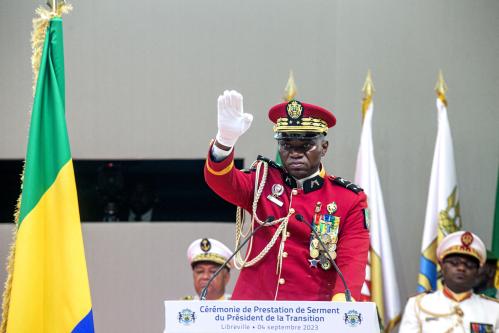
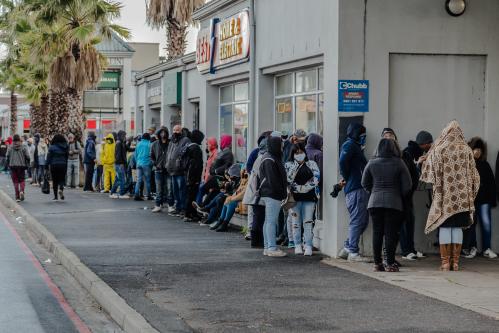
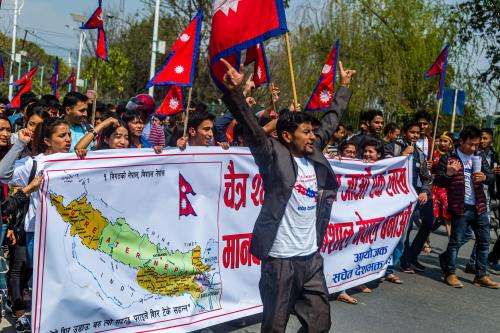
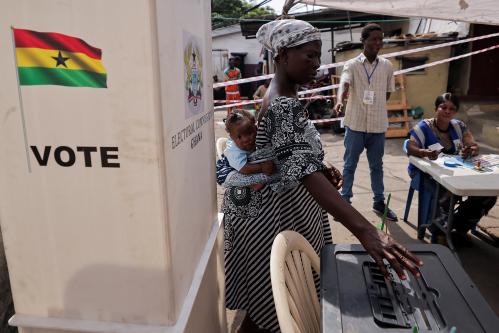
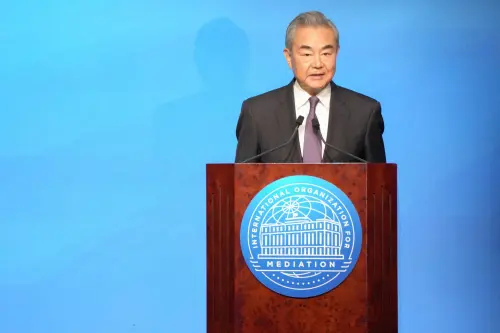

Commentary
Back to the brink? Madagascar’s polarizing presidential elections
November 13, 2023